 Petzlover
Petzlover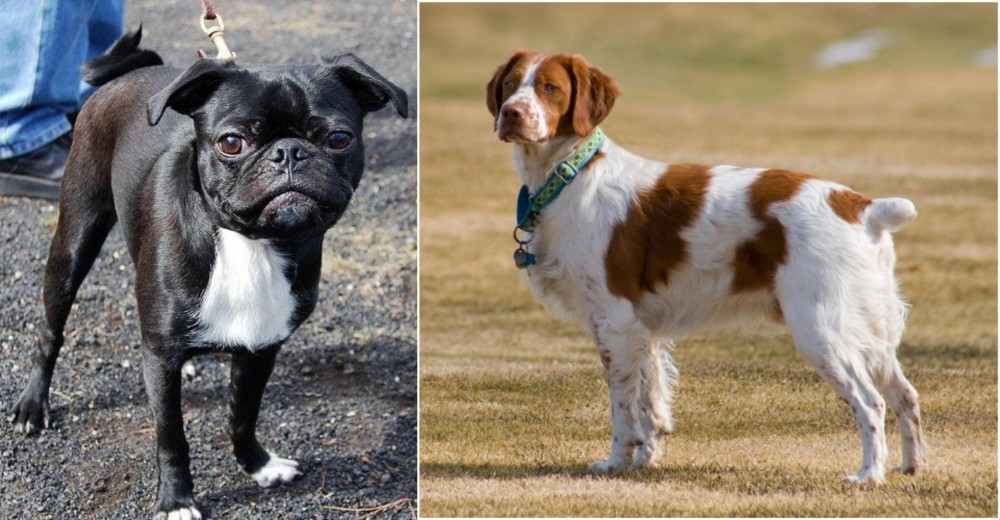 Bugg is originated from United States but French Brittany is originated from France. Bugg may grow 18 cm / 8 inches higher than French Brittany. Bugg may weigh 9 kg / 19 pounds lesser than French Brittany. Both Bugg and French Brittany has same life span. Both Bugg and French Brittany has same litter size. Bugg requires Moderate Maintenance. But French Brittany requires Low Maintenance
Bugg is originated from United States but French Brittany is originated from France. Bugg may grow 18 cm / 8 inches higher than French Brittany. Bugg may weigh 9 kg / 19 pounds lesser than French Brittany. Both Bugg and French Brittany has same life span. Both Bugg and French Brittany has same litter size. Bugg requires Moderate Maintenance. But French Brittany requires Low Maintenance
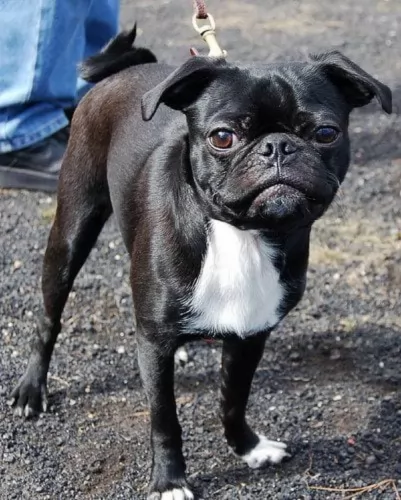 The Bugg is generally a cross between a Boston Terrier and a Pug. There is no clear history in terms of who started this hybrid dog that was recognized initially be the IDCR or International Designer Canine Registry in 2009. This very cute little dog has become increasingly popular in a very short period of time. Crossing these two breeds created a small dog that loves to sit in your lap as well a romp and play.
The Bugg is generally a cross between a Boston Terrier and a Pug. There is no clear history in terms of who started this hybrid dog that was recognized initially be the IDCR or International Designer Canine Registry in 2009. This very cute little dog has become increasingly popular in a very short period of time. Crossing these two breeds created a small dog that loves to sit in your lap as well a romp and play.
At this time the Bugg is recognized by several of the hybrid and designer registries and clubs. This would include in addition to the IDCR:
 Brittanys are the product of France, actually developed in the Brittany Province. They are gun dogs designed to hunt birds. Referred to more often than not as a Spaniel their method of working is much more in line with the setters and pointers. They are believed to be developed somewhere between the 17th and 19th centuries, but not recognized until the 20th century. Orange and white dogs were portrayed on 17th century tapestries, hunting and retrieving. In 1850 the Reverend Davies wrote the first record of Brittanys that was verifiable.
Brittanys are the product of France, actually developed in the Brittany Province. They are gun dogs designed to hunt birds. Referred to more often than not as a Spaniel their method of working is much more in line with the setters and pointers. They are believed to be developed somewhere between the 17th and 19th centuries, but not recognized until the 20th century. Orange and white dogs were portrayed on 17th century tapestries, hunting and retrieving. In 1850 the Reverend Davies wrote the first record of Brittanys that was verifiable.
The Brittany was recognized for the first time in 1907 as their own breed even though they participated in the Paris Dog Show in 1900. Once recognized the standards were written as well. It was not until 1931 that the breed was recognized in America and 1934 before the American Kennel Club approved them. Until 1982 they were known as the French Brittany Spaniel. The Spaniel was dropped in ’82. In the United Kingdom the Brittany is known as an HPR (Hunt, Point and Retrieve) breed and they do so with both birds and small game such as hares. The Brittany’s have more dual champions than any other American Kennel Club Sporting Breed in both Confirmation and Field Trials.
There are some differences between the current day French Brittany and the “American Brittany”. They are the same breed but different sub-sets and there are differences that can be noted between the two. The French Brittany is smaller than the newer American version and works closer to the hunter and the guns, while the American Brittany runs ahead of the hunter quite often. Some breeders however don’t consider these differences to be sub-sets and believe that the American breeders should accept the French standards reflecting the origin of the breed.
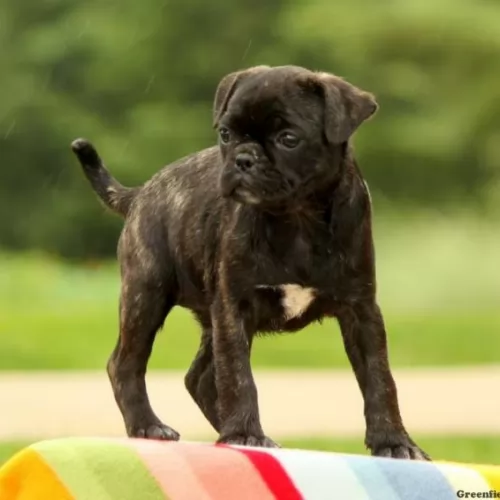 This cross between the Boston Terrier and Pug can have several different looks depending upon whether the individual dog resembles the Pug or the Boston more. Some usual but not always physical characteristics include curly tails, droopy ears and a stocky body in a small dog. They usually have soft, straight coats. Most Buggs look more like the Boston than the Pug although they have the more smashed muzzles and shorter legs of the Pug. The heads are round with almond shaped eyes.
This cross between the Boston Terrier and Pug can have several different looks depending upon whether the individual dog resembles the Pug or the Boston more. Some usual but not always physical characteristics include curly tails, droopy ears and a stocky body in a small dog. They usually have soft, straight coats. Most Buggs look more like the Boston than the Pug although they have the more smashed muzzles and shorter legs of the Pug. The heads are round with almond shaped eyes.
 The French Brittany is an energetic, compact, solid, athletic dog. They have average size heads, intelligent expressions, floppy ears, and a long, elastic and free gait. Most Brittanys are born with short tails but if not, they are docked outside the United Kingdom. Docking is illegal in the United Kingdom so those Brittanys might have a long tail.
The French Brittany is an energetic, compact, solid, athletic dog. They have average size heads, intelligent expressions, floppy ears, and a long, elastic and free gait. Most Brittanys are born with short tails but if not, they are docked outside the United Kingdom. Docking is illegal in the United Kingdom so those Brittanys might have a long tail.
Their coats are orange roan, orange and white and liver roan. A tricoat of orange, liver and white is allowed within a specific placement of the three colors.
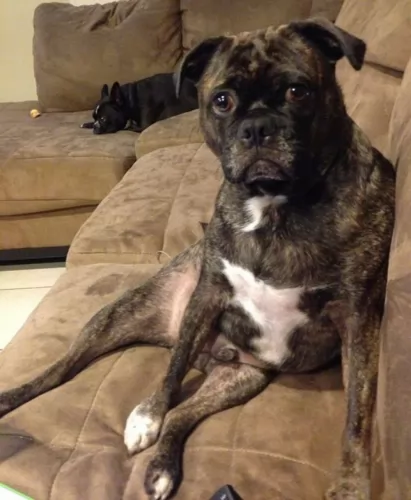 This crossbreed is easily trainable and highly intelligent. They might be stubborn like the Boston or devoted like the Pug. They can have characteristics of both parents and be loving, playful lapdogs. They love to play with children, but they can be territorial like the Boston. The Bugg is a small dog with a big attitude. They are affectionate and sweet, friendly towards people and other animals. Since the Boston and the Pug have very similar characteristics and temperament, you can have a pretty good idea what your Bugg will be like.
This crossbreed is easily trainable and highly intelligent. They might be stubborn like the Boston or devoted like the Pug. They can have characteristics of both parents and be loving, playful lapdogs. They love to play with children, but they can be territorial like the Boston. The Bugg is a small dog with a big attitude. They are affectionate and sweet, friendly towards people and other animals. Since the Boston and the Pug have very similar characteristics and temperament, you can have a pretty good idea what your Bugg will be like.
Dual champions in Field Trials and Confirmation. They both point and retrieve.
They are not as adaptable as some hunting breeds. They are very active and need space both indoors and out. They are not recommended for life in apartments in the city. A rural environment is best. They do not adapt well to the damp and cold weather.
They are very intelligent and have very high learning ability.
 Generally, a hardy breed that is mostly healthy, the Brittany in France usually lives on average 12 years 6 months. In the UK the average if 12 years and 11 months and many dogs living to be 14 or 15. Some of the health issues that might pop up for the Brittany include:
Generally, a hardy breed that is mostly healthy, the Brittany in France usually lives on average 12 years 6 months. In the UK the average if 12 years and 11 months and many dogs living to be 14 or 15. Some of the health issues that might pop up for the Brittany include:
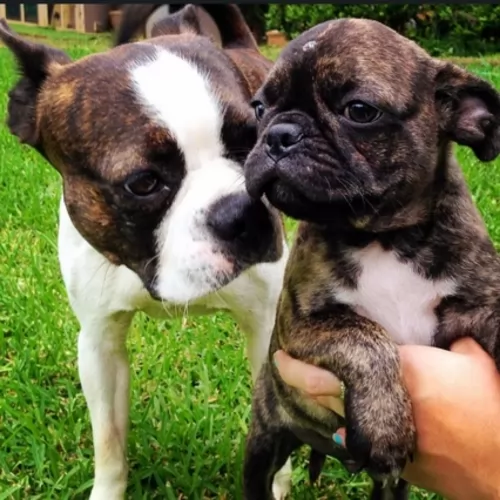 Buggs love to eat and will anything you give them and some things that you don’t. They can become obese very easily so watch their food intake. These small dogs should be eating food made for small dogs. Feed them only ¾ to 1 and ½ cups of dry food per day split into two meals.
Buggs love to eat and will anything you give them and some things that you don’t. They can become obese very easily so watch their food intake. These small dogs should be eating food made for small dogs. Feed them only ¾ to 1 and ½ cups of dry food per day split into two meals.
The Bugg can inherit health problems from either the Boston or the Pug, or they may be healthier than either parent breed. Both of these parent breeds are given to Brachycephalic issues due to their mashed faces. They could face respiratory issues or eye issues because of this.
The Bugg is a very energetic and playful dog. They love to run, play and go on walks. Just one walk or play session per day is enough exercise for this little dog. You can easily have your play time inside if you don’t have a fenced yard. Because of their faces and breathing issues do not let them get overheated.
 Feed puppies a high quality puppy food designed for medium sized dogs. Give about one to one and a half cups per day in 2-3 meals.
Feed puppies a high quality puppy food designed for medium sized dogs. Give about one to one and a half cups per day in 2-3 meals.
For the adult French Brittany feed a high quality adult dry food designed for medium sized dogs. Give about two cups per day in 2 meals.
Excellent vision and scent
The French Brittany is an active and enthusiastic bird dog that loves to exercise. They have the stamina and drive that goes with an efficient and successful hunting dog. They need daily exercise, regular walks and excel at field trials and confirmation. They are also good at lure chase, flyball, rally and obedience.